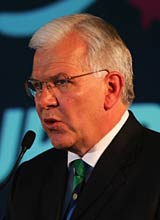Super Series' future uncertain
Australia's dominance of the four-match Super Series has forced the ICC to abort a plan to stage it every four years
Peter English at the SCG
17-Oct-2005
|
|

|
Australia's dominance of the four-match Super Series has forced the ICC to abort a plan to stage it every four years. Malcolm Speed, the ICC chief executive, downgraded the tournament from a regular event on the calendar following Australia's 210-run Super Test victory at the SCG today.
"For the concept to succeed it needs one team to stand out of the pack and be the best in the world," Speed said. "We've seen that with Australia but it's not something that we will put in on a regular basis or something we will play every two, four or six years. If a team emerges that justifies being called the best in the world we may take the opportunity to put the rest of the world together."
The move was a turnaround from the ICC's public statements in the lead-up to the series. An ICC spokesman insisted the event was a trial and that no commitment had been made to play it on a regular basis in between World Cups and Champions Trophies.
However, a press release on the ICC's website said the organisation hoped the series would become a regular feature and was "planned to be played every four years". "Every four years starting on 1 April 2005 the top team in the ICC Test Championship will qualify to play the Team of Champions in the ICC Super Series Test for a winner-takes-all prize," the release said when the venues for the tournament were announced.
Doubt over the future of the series was also shared with the issue of technology and Speed said the use of television replays for all decisions was still in the trial stage. "We will take a cautious approach with it and we've been quite careful with technology," he said. "We will evaluate what happens here, just as we did after the Champions Trophy in Sri Lanka in 2002."
The World XI performances during the series were disappointing but Speed said there were no plans to recall the international status given to the Test and one-day games. "The board was happy with the decision and we've been criticised because some other matches 20 or 30 years ago weren't given it," he said. "We don't go back to review decisions of administrators of the past and we don't expect the ones in the future to review these decisions."
While the series is expected to be a commercial success because of the massive global audience, Speed was disappointed with the size of the crowds and said he wanted an extra 4000 spectators each day. "We also would have liked more runs from the World XI," he said.
Peter English is the Australasian editor of Cricinfo